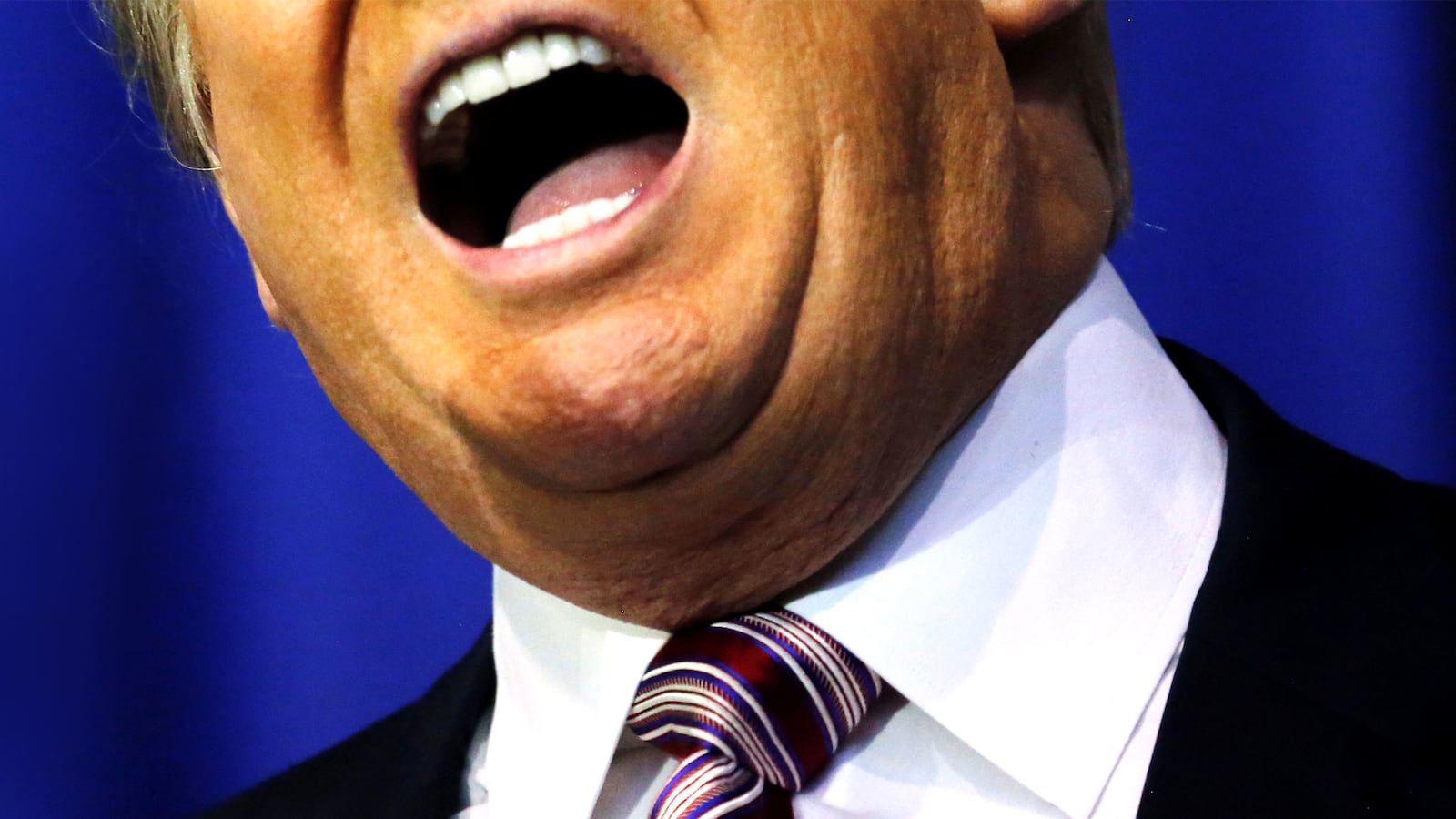U.S. spy chiefs presented their case at Trump Tower on Friday that Russia was behind the hacks that rocked the 2016 presidential election. But they didn’t help themselves by releasing a strongly-worded report that is scant on new evidence—and is, in some cases, a literal rehash of outdated information.
“There was absolutely no effect on the outcome of the election including the fact that there was no tampering whatsoever with voting machines,” President-elect Trump said in a statement right after he met with Director of National Intelligence James Clapper, CIA Director John Brennan, FBI Director Jim Comey, and NSA chief Adm. Michael Rogers.
“Russian President Vladimir Putin ordered an influence campaign in 2016 aimed at the U.S. presidential election [and with]… a clear preference for President-elect Trump,” the intelligence chiefs announced through an unclassified report released after the meeting that sounded like it was coming from an alternate universe.
The night-and-day report and reaction hint at either a difficult relationship to come between the president and America’s spies, or a cagey response by a future commander in chief who is only beginning to realize how the chess masters in the Kremlin play the game of geopolitics.
The unclassified report is unlikely to convince a single skeptic, as it offers none of the evidence intelligence officials say they have to back it up—none of those emails or transcripts of phone calls showing a clear connection between the Russian government and the political intrusions. The reason—revealing how U.S. spies know what they know could endanger U.S. spy operations.
And it contains some out-dated information that seems slapdash considering the attention focused on it. Errors in the report were almost inevitable, because of the haste in which it was prepared, said one U.S. official briefed on the report. The report comes in three levels—unclassified, classified and then one so top secret that only a handful of intelligence professionals was able to view the whole thing. That most classified report is the one that went to President Barack Obama, and to Trump. The merely classified version will be briefed to lawmakers in the coming days. The classification issues alone meant it was “hard to transmit around” to be fact-checked, the official said, speaking on condition of anonymity because he was not authorized to discuss the matter publicly.
“The unclassified report is not particularly impressive,” Susan Hennessey, a former NSA official, told The Daily Beast in an email. “It basically confirms what those who had been paying attention already know. It may serve to limit Trump for purposes of plausible deniability. But this is a highly risk-averse document that shows deference to the protection of sources and methods over informing the American people. That’s a shame, as certainly more detail could have been safely provided.”
That lack of specificity makes it easier for Trump to stay in the “see no, hear no, speak no evil” column. His post-spy-summit statement seemed to cherry-pick the intelligence, only mentioning parts of the briefing that confirmed his belief that election vote tallies were not tampered with, rather than the part that described how the Democratic National Committee and key Hillary Clinton campaign officials were hacked, and their emails released to devastating result.
Then again, maybe the scales did fall from his eyes behind those closed doors, and he did believe the “forensic evidence” the spies had gathered, as described by current and former U.S. intelligence officials, including emails between Russian officials celebrating the results of the election, and intercepted conversations showing they’d hoped to sow discord and doubt, whoever got elected.
Perhaps the president-elect just got a crash course in “Moscow Rules,” and is beginning to understand the world-class hacking machine at Russian President Vladimir Putin’s disposal. The rules, established for U.S. spies working in Moscow during the Cold War, include: Don’t harass the opposition; lull them into a sense of complacency; and pick the time and place for action.
After all, Trump did call the meeting with intelligence officials “constructive,” adding that he has “tremendous respect for the work and service done by the men and women of this community to our great nation,” after a week of tweets that made derisive references to U.S. spies.
He also promised to “aggressively combat and stop cyberattacks,” when he takes office, appointing a team to give him a plan within 90 days of taking office.
That wasn’t enough for top Democrats on the House and Senate intelligence committees.
“Russian officials at the highest levels engaged in an unprecedented level of interference in our elections, and these actions had the goal of harming the candidacy of Hillary Clinton and boosting the candidacy of President-elect Donald Trump,” said Senate Intelligence Committee Vice Chair Mark Warner (D-VA), in a statement.
“The President-Elect’s statement that the Russian hacking had ‘absolutely no effect on the outcome of the election’ is not supported by the briefing, report, or common sense,” said House Intelligence ranking member Adam Schiff (D-CA), in a statement. “It is one thing to say that there was no tampering with vote tallying—which is true—it is another thing to say that the daily dumping of documents disparaging to Secretary Clinton that was made possible by Russian cyber operations had no effect on the campaigns.” Schiff said the election results should stand, but such interference stopped from ever happening again.
House Speaker Paul Ryan split the baby in his reaction, both trusting the intelligence community’s conclusions and toeing the party line that Trump’s election is legitimate despite the hacking.
“Russia has a track record of working against our interests, and they clearly tried to meddle in our political system,” he said in a statement Friday. “We must also be clear that there is no evidence that there was any interference in the voting or balloting process… Donald Trump won this election fair and square because he heard the voices of Americans who felt forgotten.”
This is the second official U.S. report in eight days to undercut the government’s assertion that Russia was behind the election-related hacks. Last week, the Department of Homeland Security and the FBI released a technical document that was widely criticized by cybersecurity experts for being little more than a hodge-podge of random Internet Protocol addresses and code names for hacker gangs suspected of having ties to Moscow. The result was an almost immediate scare that Russian hackers had “penetrated” part of Vermont’s power grid that was discredited within a matter of hours.
“At every level this report is a failure,” security researcher Robert M. Lee told The Daily Beast about the DHS/FBI document. “It didn’t do what it set out to do, and it didn’t provide useful data. They’re handing out bad information to the industry when good information exists.”
And perhaps that’s the strangest thing about this new Intelligence Community report. High-profile cybersecurity firms have publicly released technical and circumstantial evidence that strongly ties the DNC intrusions to hackers long believed to be Kremlin-connected.
“We’ve analyzed the tools, the binaries, and the infrastructure that was used in the attack, and from that we can confirm that it’s connected to a group” long considered to be an arm of a Russian intelligence service, Symantec’s Eric Chien told The Daily Beast.
“From the binary analysis point of view, I can tell you that the activities of these attackers have been during Russian working hours,” Eric Chien added. “They don’t work Russian holidays; they work Monday to Friday; there are language identifiers inside that are Russian; when you look at all the victim profiles they would be in interest to the Russian nation-state.”
Friday’s report, a compilation of conclusions from 17 different U.S. intelligence agencies, doesn’t add “smoking gun” details like those. It’s full of details but doesn’t add much that’s new. It says Moscow has “a longstanding desire to undermine the U.S.-led liberal democratic order.”
We learn that Vladimir Putin never much liked Hillary Clinton and preferred the election of her rival, who over several years has referred to Putin as “smart,” stronger, and more capable than the incumbent U.S. president, exonerated him from the killing of political opponents or the invasion of European territory, and sought to make him his “best friend.”
We learn that pro-Kremlin trolls created hashtags designed to undermine faith in American democracy when they believed Clinton was likely to win, and then stopped calling into question American democracy when, much to their evident surprise, Trump did.
We learn that, in addition to cyberespionage campaigns, run separately by both Russia’s domestic and military intelligence services, the Kremlin resorted to “multifaceted” forms of information warfare to weaken the Democratic nominee’s standing in the public imagination. This included, but was not limited to, instructing its English-language fake media portals, Russia Today (RT) and Sputnik, to question Clinton’s health, her relationship to ISIS, and where the money her charity raised actually went.
We learn that Russia has spent $200 million a year in disinformation and propaganda, run through TV and social media platforms that are overseen or staffed by Russian government officials and/or the offspring of them and devoted to helping convince credulous Americans that their country is a plutocratic surveillance state with no free and fair election of national figures. Unlike, say, Russia.
We also learn that the intelligence community is publishing information that is out of date. The report’s “Annex A,” focusing on the role of RT, “was originally published on 11 December 2012.” Because it’s so old, that annex incorrectly lists Aleksey Pushkov as the “current chair of the Duma Foreign Affairs Committee.” Pushkov is no longer in the Duma. It also lists his daughter Darya Pushkova as the current head of RT’s London Bureau. She used to work for RT years ago, but no longer does and is certainly not head of the London Bureau.
While the document goes out of its way not to reveal much about U.S. intelligence’s methodology and sourcing, there are hints at how spy agencies arrived at their conclusions.
There is a strong suggestion, for instance, that human intelligence—spies and informants run by the CIA in Moscow and possibly working within to close to the Russian government—played a stronger role in determining the U.S. intelligence community judgment of why Putin ordered the hacking. All three major intelligence agencies, the NSA, CIA, and FBI, agree that the Russian government was behind it. But curiously, the one in charge of intercepting communications and running cyberoperations (like piecing together a digital breadcrumb trail back to the hackers) is less confident than the CIA and FBI about the motive. The CIA and FBI have “high confidence” that it was to destroy Clinton and promote Trump; the NSA has only “moderate confidence” in that assessment.
Furthermore, and not that this will come as much of a surprise, the document confirms that the contents of both the DNC and Podesta emails are indeed authentic, noting that WikiLeaks was chosen by Putin as the designated disseminator of the hacks owing to its “self-proclaimed reputation for authenticity. Disclosures through WikiLeaks did not contain any evident forgeries.” That runs counter to the notion, put forward by the Hillary Clinton campaign, that the leaked emails might not be real.
Nevertheless, Friday’s report leaves “big looming unanswered questions, including the ones no one really wants to ask,” according to Hennessey, the former NSA official. “The big one is whether there is any evidence of a U.S. Person—whether connected or unconnected with Trump campaign—who had knowledge of or participated in the operation.
“I say it’s the big one because it is the only thing that could be actually game changing. Currently there is no public evidence of collusion with Trump or his staff, but considering the President-Elect’s own statements, it’s certainly on people’s minds. The U.S. government should affirmatively put it to rest by either saying there is no evidence of any misconduct or by acknowledging an ongoing investigation,” she added.
The government did no such thing on Friday, however, which means the questions will only continue.








